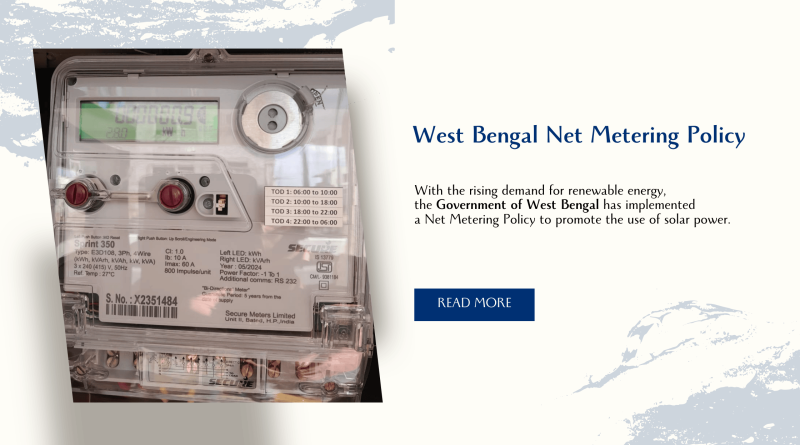West Bengal Net Metering Policy
With the rising demand for renewable energy, the Government of West Bengal has implemented a Net Metering Policy to promote the use of solar power. This policy allows consumers to install solar power systems and offset their electricity bills by exporting excess power to the grid. West Bengal’s net metering policy is designed to make solar energy more accessible to residential, commercial, and industrial consumers, and to encourage a shift towards sustainable energy use.
Table of Contents
- 1 What is Net Metering?
- 1.1 Key Features of the West Bengal Net Metering Policy
- 1.2 1. Eligibility
- 1.3 2. Solar System Capacity
- 1.4 3. Energy Credits and Settlement
- 1.5 4. Billing Mechanism
- 1.6 5. Installation and Maintenance
- 1.7 6. Grid Connectivity
- 1.8 Benefits of the West Bengal Net Metering Policy
- 1.9 1. Reduced Electricity Bills
- 1.10 2. Environmental Benefits
- 1.11 3. Energy Independence
- 1.12 4. Government Incentives
- 1.13 Key Highlights of West Bengal Net Metering Policy
- 1.14 How to Apply for Net Metering in West Bengal
- 1.15 1. Check Eligibility
- 1.16 2. Select a Vendor
- 1.17 3. Apply for Net Metering
- 1.18 4. Install the Solar System
- 1.19 5. Inspection and Approval
- 1.20 6. Start Generating Energy
What is Net Metering?
Net Metering is a billing system where consumers who generate their own solar energy can export excess energy back to the grid. This excess energy earns credits, which can be used to offset future electricity consumption. The policy provides dual benefits—reducing electricity bills and promoting the use of renewable energy sources, like solar.
Key Features of the West Bengal Net Metering Policy
1. Eligibility
- Consumer Types: Residential, commercial, industrial, and institutional.
- Connection Size: Solar rooftop systems between 1 kW and 2 MW are eligible.
- Connection Type: Consumers must be connected to the grid through the West Bengal State Electricity Distribution Company Limited (WBSEDCL) or the Calcutta Electric Supply Corporation (CESC).
2. Solar System Capacity
- The solar rooftop capacity should not exceed the contract demand or sanctioned load of the consumer’s existing connection.
- The maximum allowable capacity is 2 MW.
3. Energy Credits and Settlement
- Any surplus electricity generated is sent to the grid, and the consumer earns energy credits.
- Settlement Period: The credits are settled monthly, and excess credits are carried forward.
- Credits can be utilized to offset the electricity bill, reducing overall costs.
4. Billing Mechanism
- A bi-directional meter records both the electricity consumed from the grid and the electricity exported to the grid.
- Consumers are billed based on the net energy consumed, which is the difference between the energy imported and the energy exported.
5. Installation and Maintenance
- Consumers are responsible for the installation and maintenance of the solar power system.
- Only approved vendors and installers must be used for the installation to ensure compliance with standards.
6. Grid Connectivity
- The West Bengal Electricity Regulatory Commission (WBERC) regulates the connection of solar systems to the grid.
- The solar system must meet the technical standards specified by the distribution company to ensure safe grid interconnection.
Benefits of the West Bengal Net Metering Policy
1. Reduced Electricity Bills
By generating their own electricity and exporting excess to the grid, consumers can drastically reduce their electricity bills. The savings can help recover the investment in solar installation over time.
2. Environmental Benefits
The use of solar energy reduces dependency on non-renewable sources like coal and oil. It directly contributes to reducing greenhouse gas emissions and helps combat climate change.
3. Energy Independence
Consumers producing their own solar power reduce their reliance on traditional grid electricity, which is subject to price fluctuations and supply issues.
4. Government Incentives
The Indian government provides subsidies and financial support through the Ministry of New and Renewable Energy (MNRE) to promote solar rooftop installations.
Key Highlights of West Bengal Net Metering Policy
| Aspect | Details |
|---|---|
| Eligible Consumers | Residential, Commercial, Industrial, and Institutional |
| System Size | 1 kW to 2 MW |
| Maximum Solar Capacity | Equal to the sanctioned load or contract demand |
| Billing Mechanism | Net metering with bi-directional meter |
| Excess Energy Settlement | Monthly credit for surplus energy exported |
| Meter Type | Bi-directional meter |
| Initial Investment | Consumers bear the cost of system installation |
| Maintenance | Consumer responsibility |
| Incentives | Subsidies from MNRE available for rooftop solar installations |
| Connection | Must be connected to WBSEDCL or CESC grid |
| Settlement Period | Monthly, with credits carried forward |
| Regulating Authority | West Bengal Electricity Regulatory Commission (WBERC) |
| Energy Credit Validity | Credits can be carried over for future billing cycles |
| Environmental Benefit | Helps reduce carbon emissions and promotes renewable energy use |
How to Apply for Net Metering in West Bengal
1. Check Eligibility
Ensure that your premises (residential, commercial, or industrial) meet the criteria for solar rooftop installations under the net metering policy.
2. Select a Vendor
Choose an approved vendor for solar installation. The vendor should follow the specifications set by the WBSEDCL or CESC for rooftop installations.
3. Apply for Net Metering
Submit an application to your electricity distribution company (WBSEDCL or CESC) for net metering connectivity. The application form is usually available on their official website.
4. Install the Solar System
After receiving approval, install the rooftop solar system and set up the bi-directional meter. The installation should comply with technical standards for safe grid interconnection.
5. Inspection and Approval
Once the system is installed, it will be inspected by the distribution company to ensure that all technical standards are met. Upon approval, the system can be connected to the grid.
6. Start Generating Energy
Once connected, the system will begin generating solar energy. Any excess energy produced is exported to the grid, and the credits will reduce your electricity bill.
Conclusion
The West Bengal Net Metering Policy is an excellent opportunity for consumers to adopt solar energy and reduce their reliance on traditional electricity sources. By installing solar rooftop systems, consumers not only save on electricity bills but also contribute to the promotion of clean, renewable energy. The government’s incentives and the state’s net metering policy make it easier for individuals and businesses to take this eco-friendly step.
Ready to Save on Electricity Bills with Solar Power?
With Net Metering, you can drastically reduce your electricity costs by generating your own solar power and sending any excess back to the grid. It’s time to harness the sun’s energy and make a positive impact on both your wallet and the environment!
At SolarClue, we make the transition to solar simple, efficient, and affordable. Whether you’re a homeowner, business, or institution, our team of solar experts will guide you through the process—from installation to maintenance—so you can start saving from day one.
🌞 Take the first step towards energy independence today!
🔋 Get your solar consultation now!
Contact SolarClue or call us at +91-888-4444-830 to explore the best solar solutions for your home or business.
Go Solar. Save More. Power Your Future with SolarClue!
FAQs
1. What is the maximum capacity for a solar rooftop system in West Bengal?
The maximum allowable capacity for a solar rooftop system under West Bengal’s net metering policy is 2 MW.
2. How are energy credits calculated?
Energy credits are calculated based on the excess electricity exported to the grid and are settled on a monthly basis.
3. Can I install a solar rooftop system if I live in an apartment?
Yes, apartment dwellers can install solar systems under the net metering policy, provided they meet the eligibility requirements and have proper space for installation.
4. How long will it take to recover the cost of installing a solar system?
The payback period usually ranges from 5 to 8 years, depending on electricity usage and system size.
5. Does the government offer any financial assistance for installing solar panels?
Yes, the Government of India offers subsidies through the Ministry of New and Renewable Energy (MNRE) for solar rooftop installations.



